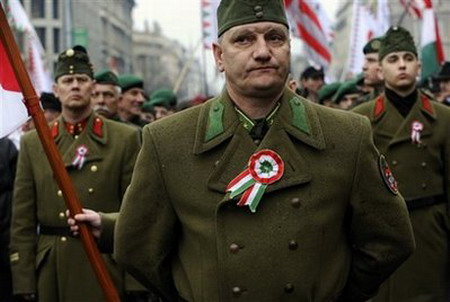BUDAPEST, Hungary -- Several thousand people held anti-government protests in the Hungarian capital during a national holiday on Sunday, and police detained 35 people.
|

Hungarian radicals in WWII style military uniforms participate in a demonstration against Prime Minister Ferenc Gyurcsany and his Socialist government during national day marking the anniversary of the 1848-1849 revolution and war against the Habsburg's in Budapest, Hungary, Sunday, March 15, 2009. [Agencies]
|
Dressed in riot gear, the police chased some of the protesters through the streets of Budapest and prevented them from reaching Parliament, where violent anti-government protests had taken place in 2006.
At one point Sunday, tear gas was used to drive back a small group of demonstrators that tried to attack police lines near St. Stephen's Basilica, but law enforcement officials denied claims by Krisztina Morvai, a right-wing politician taking part in the protests, that she was beaten by police.
The detainees included Gyorgy Budahazy and Laszlo Torockai, leaders of extreme right-wing radical groups, said Budapest police spokeswoman Eva Tafferner. The radicals have been holding sometimes violent protests for years against Socialist Prime Minister Ferenc Gyurcsany, who came to power in 2004. But Hungary's current economic crisis has intensified anti-government sentiment in the country.
Also Sunday, another radical group, the Hungarian Guard, swore in 600 new members at Budapest's Heroes' Square. A local court disbanded the group last year, but the Guard is appealing the ruling.
Hungary has been among the countries in Eastern Europe hardest hit by the global economic crisis, and it received a $25.1 billion bailout led by the International Monetary Fund late last year. Hungary's economy is expected to shrink by at least 4 percent in 2009.
Sunday's national holiday commemorates the unsuccessful 1848 revolution against the royal house of Habsburgs.

